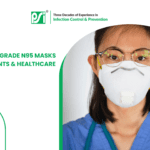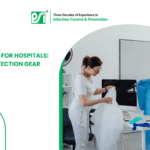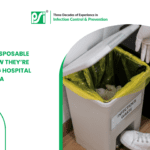Quality Assurance in Disposable Medical Products -Ensuring Maximum Safety
In the present era of the promotion and use of disposable medical products, quality assurance in healthcare needs a lot more to be stressed as this talk is about patient safety. Through such products, the rate of infection and contamination is minimized to ensure patient safety. Compliance with standards and rules is important to maintaining the integrity of these items. Furthermore, the design and application of biodegradable medical products have risen in significance giving hope to environmentally friendly alternatives that do not compromise safety or efficacy.
Rigorous Testing Procedures
The disposable medical products manufacturers conduct tests like sterility tests, biocompatibility and performance-related examinations amongst many others to make sure that the product is safe. Quality Control measures, like pre-production and in-process testing, have to be done to penalize post-production. These tests ensure that the disposable items not only meet safety standards but also offer reliable and safe use within healthcare settings.
Real-Life Examples of Testing Outcomes Improving Product Safety
1. A top Disposable Medical Products Manufacturer in the United States mandated a new sterility testing procedure for surgical gloves. At scale, this helped deliver sterile gloves with which to carry out surgery across the country – greatly reducing infection after surgeries.
2. On behalf of a European disposable catheter manufacturer we conducted wide biocompatible tests to confirm that the materials used in this device will not cause adverse reactions due to long-term hospitalization. This approach made a catheter that is much safer to use and is so convincing it has been adopted across European health systems.
3. In Japan, one of the largest disposable IV set manufacturers conducted rigorous performance testing. Such tests ensured the systems were capable of reliably dispensing fluids in minute amounts, thereby preventing potential mistakes in dosage. This has had a significant benefit in preserving patient safety and therapeutic efficacy across multiple medical disciplines.
Adherence to Regulatory Standards
 ISO, FDA and CE marking international standards are required for medical product safety. In other words, if you want disposable medical products to work reliably and effectively these regulatory requirements need to be in place. Moreover, these standards are important for biodegradable medical devices to show compliance with both safety and environmental issues.
ISO, FDA and CE marking international standards are required for medical product safety. In other words, if you want disposable medical products to work reliably and effectively these regulatory requirements need to be in place. Moreover, these standards are important for biodegradable medical devices to show compliance with both safety and environmental issues.
Compliance Enhancing Product Reliability: A Case Studies
- German syringes receive ISO Certification: A german based manufacturer is awarded with the certification as per ISO standards, it should maintain prudent quality management for Disposable Syringes. This compliance enabled high reliability of the product, making it popular among European hospitals and clinics.
- USA-approved biodegradable stent: A company in the USA got FDA approval for its Biodegradable Stents as it had to go through a tough process and trials over safety, security & efficacy. This had the double benefit of improving product reliability and patient outcomes, which increased its use in cardiovascular treatments.
- Catheters (CE Marking) UK: a British manufacturer designed disposable catheters that fit the highest safety and performance thresholds according to European standards. It is this compliance that greatly increased the robustness of these catheters, as per a wider installation across hospitals throughout Europe.
Materials Selection and Sourcing
When it comes to production of non-reusable materials, quality content is important. The standardization of the product, a good name in this field, is a disposable medical products manufacturer that carries out strict quality control measures for safety and use. They are the processes that ensure these final products function as they should, with safety high on their list of priorities, thus ensuring application for those in critical need.
Manufacturing Excellence
Disposable and biodegradable medical products with manufacturing excellence ensure safety of the life-saving things. Quality control greatly depends on advanced manufacturing technologies, while for the integrity of a product to remain intact it requires a dust and contaminant-free environment. Whether it is to maintain a manufacturing environment and process that ensures the safety or effectiveness of these important medical products, with continuous monitoring as well as improvement.
Employee Training and Certification
The quality of disposable items will be in question without a skilled workforce. A Disposable Medical Products Manufacturer guarantees that all of its employees participate in regular training programs and certifications. This minimization of human error, combined with multiple quality checks, ensures exceptional product execution and that disposable medical items maintain their reputation for being some of the safest and most dependable on the market.
Packaging and Sterilization
To maintain sterility in medical products they must be properly packed. Sterilization is carried out through mechanisms of steam, ethylene oxide gas, or radiation and the organism elimination capabilities are guaranteed. Packaging and sterilization, together, are vital for product safety to avoid contamination of potential pathogens that could ultimately jeopardize the efficacy of medical use in healthcare settings.
Traceability and Documentation
Comprehensive documentation is necessary for quality assurance and provides a hard record of manufacturing. Transparent end-to-end product life-tracking systems. In the medical industry, it is essential that recalls are addressed efficiently and someone held accountable to ensure product safety and reliability are at an optimal level for a recall-prone era.
Customer Feedback and Continuous Improvement
It is also important for discovering quality problems and giving direct feedback on the performance of products from a customer. Both give manufacturers a mechanism through which to collect and analyze feedback so they can find areas for improvement. The feedback and quality data, which also inform continuous improvement programs described in this section of the paper ensure that products will continue to meet high standards – improving the consistency and reliability for customers.
Conclusion
Ensuring the quality of disposable medical products is an important part of quality control. Healthcare facilities that emphasize quality in their procurement processes will be able to improve patient safety and confidence significantly. For more details about high-quality single-use disposable medical products please visit Plasti Surge Industries Pvt. Ltd.. Quality investment; protect your patients now!



